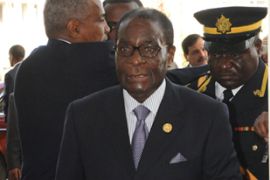Zimbabwe adopts unity amendment
Opposition leader to hold prime minister’s post in proposed coalition government.

Tsvangirai and the rest of the unity cabinet will be sworn in next week.
The government will bring together members of Mugabe’s Zanu-PF, Tsvangirai’s Movement for Democratic Change (MDC) and a smaller opposition party.
Patrick Chinamasa, a senior aide to Mugabe and the country’s acting justice minister, introduced the amendment, saying he hoped that after a “long and tortuous route”, Zimbabwe would no longer have “opposition or governing parties. It will be a new political dispensation”.
‘Equal partners’
Chinamasa’s motion was seconded by Tsvangirai’s senior aide, Tendai Biti, who said: “We do hope that Zanu-PF is going to treat us as equal partners.”
Legislators shouted “Yes!” when asked if the measure could be passed unanimously, and it was declared so. Chinamasa and Biti then shook hands, while other legislators crossed party lines to embrace.
Biti came to the assembly after a morning in court where he is being tried for treason. His case illustrates the difficulties ahead – he is being tried on charges widely derided as trumped up by Zanu-PF.
Treason carries the death penalty in Zimbabwe.
The opposition is entering the government warily, saying it has to take the step so that leaders can address the country’s widening humanitarian disaster, with most of the population dependent on international aid.
There is also a cholera epidemic blamed on the collapse of the medical and sanitation infrastructure because of a lack of money.
Economic crisis
Mugabe is accused of engineering Zimbabwe’s economic crisis through mismanagement and corruption, then ignoring his people’s desire for change as expressed at the ballot box.
Tsvangirai won the most votes in a March presidential election, then dropped out of a run-off against Mugabe because of attacks on his supporters.
The MDC also won control of parliament in March, Zanu-PF’s first defeat since independence.
The MDC has 100 seats in parliament, Zanu-PF 99 and the smaller opposition has 10. A former Zanu-PF member who ran as an independent holds one seat.